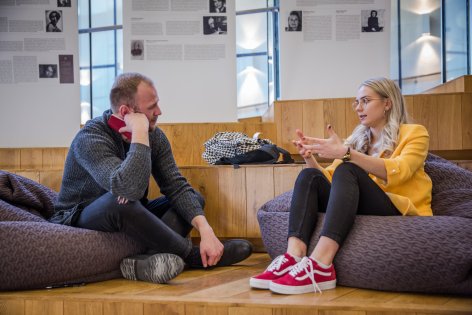Youth Work
Bachelor's
1 May
1 June
18 July
1 September
Augmented reality is the information society for young people! The University of Tartu Narva College welcomes you to Estonia's only bachelor's curriculum in youth work that combines practical learning and research. The module "Youth in the Digital Society" will help you acquire knowledge and skills about youth in the information society and the use of technology in youth work. We use innovative (digital) technologies and tools in our studies.
„If you believe that every young person is valuable to our society and you want to support them in finding their true potential, youth work is for you. Why Narva? Because here, you can learn in a multicultural environment, and by the time you graduate, you'll definitely know three languages. Narva is also a pleasant experience in itself.“


The organisation of studies takes into account the student as a whole, including the need to combine studies with work and personal life.
Youth work is work for young people and with young people. In the curriculum, we have linked theoretical and practical learning to the important values of a youth worker and created links with (working) life, encouraging the formation of professional contacts. You will get a thorough education in working with young people to become a high-level developer of the field in the future.
Acquiring professional competencies is accompanied by learning entrepreneurship, field-specific and international cooperation, and developing readiness for lifelong learning. Continuous self-analysis, the development of entrepreneurship, and the use of digital technologies are essential parts of the studies.
The curriculum is integrated with the professional community and the opportunity to study one semester abroad. Thus, you will build and expand your network with other youth workers in Estonia and abroad.
Our core teaching staff are experts in the field, including an associate professor of youth studies and other developers of the youth field. They have long-term experience on the professional qualifications committee for youth work and the longest experience managing a youth work programme.
Curriculum version:
More info: Study Information System
Narva College offers higher education with the University of Tartu's quality mark, maintains and develops academic traditions in northeast Estonia, and promotes integration into Estonian society.
We have the most innovative university building on the EU's eastern border, with excellent study and living conditions. The college hosts events for youth work students throughout the year. Students also have the opportunity to gain international study or work experience.

The number of state and private-sector youth work organisers is increasing year by year. The current total estimated number of jobs in the youth field is over 7,000.
You can find a job in a general education or vocational school, a cultural institution, a youth association, a youth camp or work camp, a local government, a state institution, or a foundation providing and coordinating youth services.
Admission requirements for Youth Work
- secondary education – please see our country-specific document requirements
- Estonian language proficiency at B2 level (international applicants or applicants who have completed secondary education abroad and who do not have required Estonian skills must prove their knowledge of the Russian or Ukrainian language at least at the B2 level) – please see our language requirements
NB! The restrictions for the citizens of the Russian Federation are specified here.
Applications are evaluated based on
- the score of the admission interview (yields 100% of the final score)
Admission interview
takes place:
- 8. July 2025 at 10:00–17:00 (international students and local students) via Zoom
- 9. July 2025 at 10:00–17:00 (local students) via Zoom
The 1-hour group interview takes place in English and via Zoom.
The admission test aims to determine the applicants' motivation to study youth work and suitability to work in the field and become a youth worker.
Topics and questions discussed at the interview:
- previous educational background;
- previous (work) experience in the field of youth work;
- motivation for choosing the curriculum;
- future plans related to youth work.
The interview assesses the relevance and clarity of the applicant's motives for choosing the curriculum:
- motivation to study youth work – max 50 points.
- suitability for studying youth work and becoming a youth worker – max 50 points.
The maximum score for the interview is 100 points. Only applicants who score 66 points or higher will be considered for admission.
For further information on assessing applicants' academic performance and calculating the admission score, see here.
How to apply
The following information applies to international students and Estonian students who graduated abroad.
The application system opens on 1 May and closes on 1 June. The following documents must be submitted electronically via DreamApply by the application deadline:
- Online application
- Official certified copy of the secondary school certificate and grade list in the original language (must include a description of the grading scale).
NB! Applicants from the member countries of EU, OECD, CIS (СНГ), Ukraine, Georgia, IB Diploma programme or graduating with A-level exams who are graduating in the upcoming spring/summer and having their secondary school certificate issued later than the application deadline should electronically submit their most recent grade list (grades for all your high school years up until the moment of application, including the grades/results for the last autumn semester) by the application deadline, 1 June. The grade list should be supplemented by an official statement from the issuing school indicating current enrolment and expected graduation date. Admitted candidates must post the certified copies of their graduation documents as soon as these have been issued (these must reach us by the end of July at the latest).
NB! Applicants from other countries can only apply if they have already obtained their final graduation documents and can submit these by the application deadline, 1 June. - Official certified translation of the secondary school certificate and grade list into English. We consider the following certified translations: 1) official translations made by the issuing institution (school, exam centre etc) bearing their original signature, stamp etc, or 2) translations certified by a sworn translator or notary.
- Proof of Estonian, Ukrainian or Russian language proficieny
- Copy of valid international passport page stating the applicant’s personal particulars
- Confirmation/receipt of application fee payment (if applicable). All international applicants are required to pay the application fee of EUR 100, unless they have Estonian citizenship and/or have completed their previous study level in Estonia. An application will only be processed after the UT has received the fee.
Submitted applications cannot be edited. It is only possible to upload new documents (e.g. graduation certificates). Applicants will receive feedback and notifications through the DreamApply system to their e-mail. Incomplete applications or those submitted by e-mail will not be considered for admission.
Applicants must send the application documents by post after receiving feedback that all application requirements are met. The documents should be posted to: Student Admissions, University of Tartu, Ülikooli 18-133, Tartu 50090, ESTONIA.
The documents must reach the university by 30 June. Only applicants whose application documents have reached the UT Student Admissions by the deadline can take the entrance examination. Applicants will be informed via DreamApply when their documents have arrived.
Requirements for educational documents
All copies of educational documents (secondary school certificate and grade list/transcript) must be officially certified. By certified, we mean that the copies should bear an original signature and seal of the authority certifying that these are true copies of the original document(s). The copies can be certified either 1) by an authorised official of the issuing institution, or 2) by a notary, or 3) with an Apostille attached. NB! Country-specific requirements may specify the way documents from certain countries must be certified. Please note that UT does not accept simple copies made based on already certified copies (primary copies are needed).
A ranking list will be formed based on the entrance examinations that take place in the beginning of July. Admission results will be announced to all applicants via DreamApply by 18 July at the latest. Admitted candidates are expected to accept or decline the offer in DreamApply in 2 days. If the decision is not communicated to UT via DreamApply by the stipulated deadline, UT reserves the right to withdraw the admission offer.
NB! It is not possible to postpone/defer the beginning of studies to the next academic year.
The official admission letter will be sent electronically via DreamApply to admitted students who have confirmed the offer.
NB! The electronic admission letter is also sufficient for non-EU students for applying for visa/residence permit in Estonian embassies.
Once the admission letter is issued, accepted students may proceed further with arranging their arrival. All non-EU students should first consult information on visa and temporary residence permit applications to be sure where and when the relevant documents need to be submitted.
NB! Please note that this programme is taught in our campus in Narva (184 km from Tartu).
Housing at the UT dormitory in Narva can be applied for a limited period in July after receiving the admissions offer.
Based upon common queries, the most important information has been summarised into a pre-arrival information website UT Getting started.
Estonian applicants should apply via National Admission Information Systems (SAIS). Further information in Estonian is available here.






